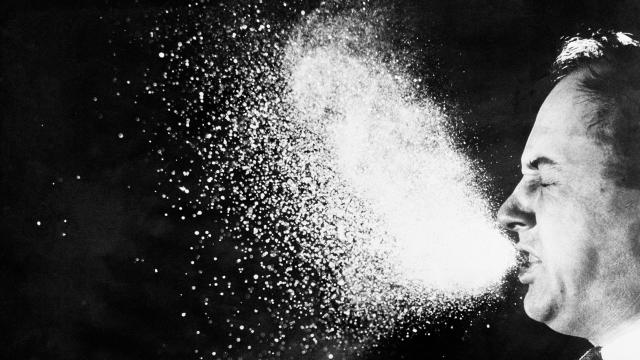Every December, for about the last 30 years, the BMJ (formerly known as the British Medical Journal) publishes a batch of studies and papers that sound way more fun than the typical science fare.
Last year, for instance, a Stanford epidemiologist asked whether caviar could be a risk factor for being a millionaire. Two years earlier, a researcher from Ohio’s Kent State University conducted a review of everything we know about zombie infections – including prevention! And this year, a paper has made the case that Peppa Pig, the popular kids’ animated show, is overtaxing UK doctors by raising expectations of how all-knowing they can be, through its character Dr. Bear. Another paper claims to have found evidence of the “man-flu” — the phenomenon of men turning into deflated balloons and becoming sicker than women the moment they feel the sniffles coming on.
These papers aren’t fake, at least not in the sense that scientists are gleefully making things up. Even the zombie paper diligently cites and combs through actual, if fictional, zombie literature, while the caviar paper was intended as a colourful example to illustrate how science should be better communicated. But they’re also not meant to be taken so seriously, as even the BMJ admits, noting that it welcomes submissions to their Christmas issue that are “light-hearted fare and satire,” but not outright spoofs or fabrications.
As Gizmodo has pointed out before, though, these joke articles get harder to laugh at every year. Not just because of the political hellscape we live in, where our president and his cronies have spent the last year systematically undermining virtually every scientific institution supported by the government, but also because of how sloppy the media tends to be when covering these papers.
The man flu paper in particular has led to a chorus of media headlines and articles proclaiming with a straight face that “new research” shows that the man flu is real, and credulously quoting the paper’s author, Kyle Sue, a Canadian family doctor, as he advocated for “male-friendly spaces, equipped with enormous televisions and reclining chairs, to be set up where men can recover from the debilitating effects of man flu in safety and comfort.”
Sue’s paper isn’t a new study though, the kind where we imagine lab coats shuffling around the lab testing mice and men. It’s just a review of some interesting research, in both animals and humans, that suggests men generally have weaker immune systems than women and offers some reasons why. The reasons range from plausible – testosterone and estrogen could weaken and strengthen the immune system, respectively – to seemingly tongue-in-cheek: Sue suggests that men could have evolved their man flu response because it kept our surviving paleolithic ancestors better protected against predators. He also cringingly turns it back around on women for choosing these high-T men to mate with in the first place.
For the sake of fairness, some outlets have noted the timing of Sue’s paper along with the BMJ‘s annual tradition, or quoted a doctor and tell the reader that no, you shouldn’t bring up your man flu to win a fight with your partner over not doing the chores. But plenty haven’t, or bury their disclaimers down at the bottom of the post where few dare to go.
Scientists have long, rightly, bemoaned the media’s bumbling coverage of their work even on a good day. So it hardly seems fair to put the blame on them when they decide to branch out and have a little fun amongst themselves. But as long as the BMJ is going to promote these articles, it ought to be more explicit about its game. Because like fruitcake and ugly sweaters, some holiday traditions are only entertaining if you’re in on the joke already.
Otherwise, you’re just duping hapless people into eating terrible food while wearing festive burlap sacks.
Update: We heard back from Dr. Sue, who insists his research is legit.
“The research is all real, despite the humorous lens it’s being examined through,” he told Gizmodo. “The comments I make about ‘man caves’, etc. are meant to be tongue-in-cheek, to get a laugh out of a common stereotype. In fact, I think both women and men could benefit from recovering in a safe, warm, comfortable place when ill!”
Naturally, Sue doesn’t believe that news outlets are being irresponsible, saying the BMJ “doesn’t publish anything that’s fake,” and that a systematic review on this topic hadn’t been attempted before.
“This topic has the potential to strongly affect humankind,” said Sue. “If there indeed is a difference in immune systems between men and women, does that mean we should be dosing vaccines differently? What about medications?”
Humour is subjective, of course, as much as you want to grab Sue and shout, “For crisssakes man, READ THE ROOM.” But his defensive response does betray how the authors of these Holiday papers and studies want to play it both ways. The science is real, but it’s still meant to be a funny joke that everyone knows is a joke – and an annoying one at that.
[BMJ]
